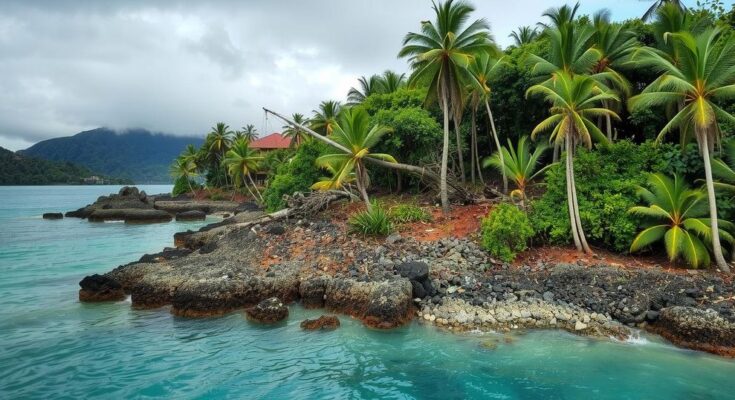Tropical Storm Dikeledi has struck Mayotte, compounding the devastation left by Cyclone Chido in December, which resulted in 39 deaths and thousands injured. The government has declared a red alert, urging residents to prepare for severe weather, and local officials are coordinating emergency responses. The storms underscore the archipelago’s vulnerability to climate change and the necessity for improved disaster management strategies and international aid.
Mayotte, the French territory in the Indian Ocean, is currently grappling with the effects of Tropical Storm Dikeledi, which has landed on the archipelago while it is still recovering from the devastation caused by Cyclone Chido back in December. Authorities have issued a red alert as the storm brings heavy rainfall and severe winds, prompting residents to prepare for further disruptions. Cyclone Chido was the most destructive storm in nearly a century, claiming the lives of at least 39 people and leaving around 5,000 injured. The region is facing critical challenges in infrastructure and disaster preparedness, and the arrival of Dikeledi is exacerbating the situation.
The government has implemented emergency measures urging citizens to gather essential resources such as food and water, and to secure safe shelters. Local officials and relief organizations are mobilizing to provide emergency assistance to the worst-hit areas. The logistical hurdles of delivering aid to this geographically isolated territory pose significant challenges, emphasizing a greater necessity for a long-term disaster management plan.
The recent storms highlight the disproportionate effect climate change has on small island territories. As global warming increases the frequency and intensity of tropical storms, regions like Mayotte are left vulnerable. Socio-economic difficulties compound the situation, as high unemployment rates, limited healthcare, and inadequate housing amplify the effects of these natural disasters.
As the community of Mayotte strives to recover from these back-to-back calamities, there is a pressing need for both immediate response and future resilience strategies. It is critical for the international community to offer financial support, technical aid, and collaborative policy initiatives to enhance climate resilience in such susceptible regions. The resilience of Mayotte’s people stands tested, yet hope remains as local and international entities work together towards a sustainable recovery and a brighter future.
The article focuses on Mayotte, a French archipelago in the Indian Ocean that is vulnerable to tropical storms. The region is currently under severe distress due to Tropical Storm Dikeledi, which follows the catastrophic Cyclone Chido that occurred in December. The recent storms have raised significant concerns regarding infrastructure, disaster preparedness, and the impact of climate change on the region. Mayotte’s socio-economic challenges further complicate its recovery from these natural disasters, revealing the urgent necessity for coordinated support and robust disaster management strategies. The overall focus is on the region’s challenges and the need for international aid amid climate change’s growing threats.
In summary, Mayotte is navigating the compounded challenges posed by Tropical Storm Dikeledi shortly after the devastation of Cyclone Chido. The region’s emergency response is underway, but significant hurdles remain in logistics and overall recovery. There is a critical need for long-term disaster management strategies and international assistance to mitigate the socio-economic impacts of such disasters and strengthen resilience against climate change. As local and global communities unite, there remains a steadfast hope for recovery and sustainable progress.
Original Source: www.travelandtourworld.com




